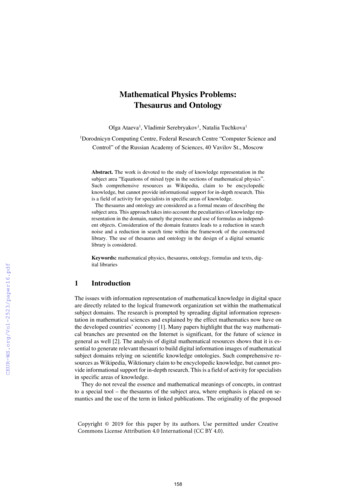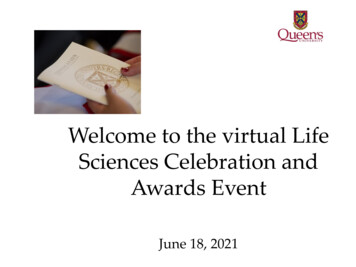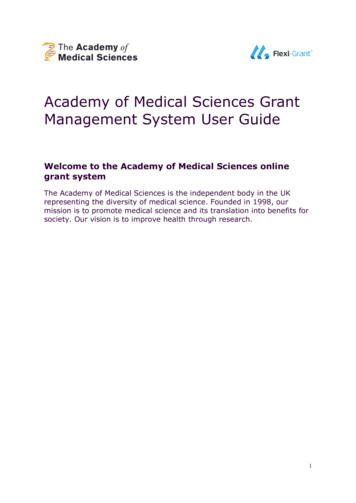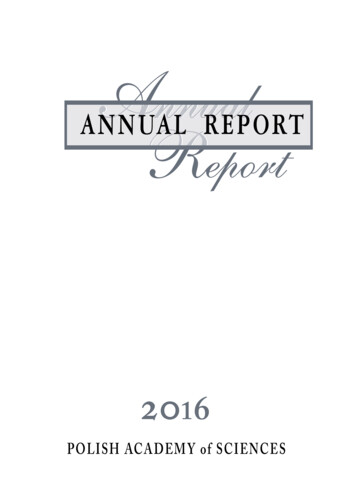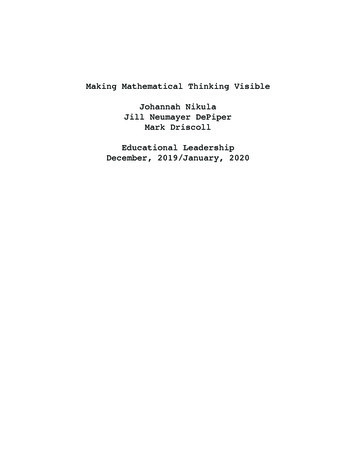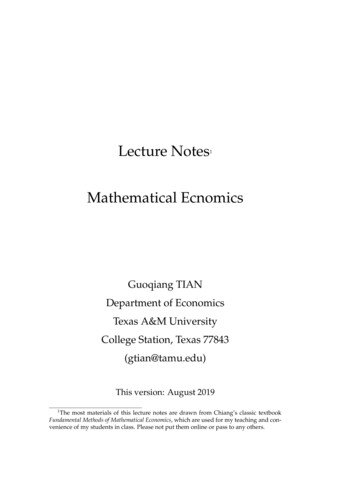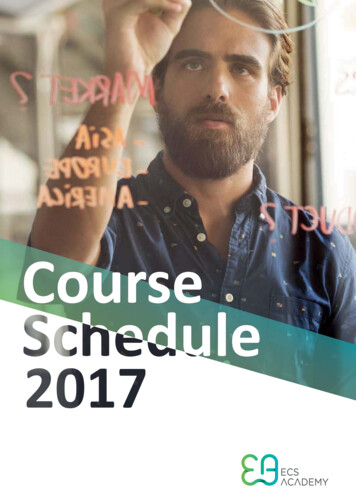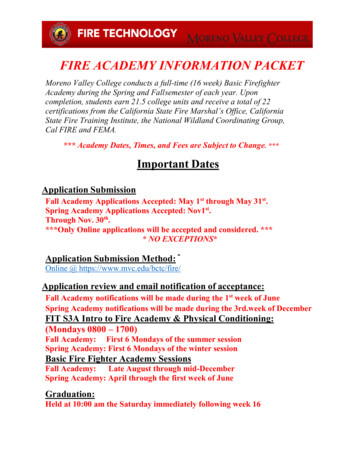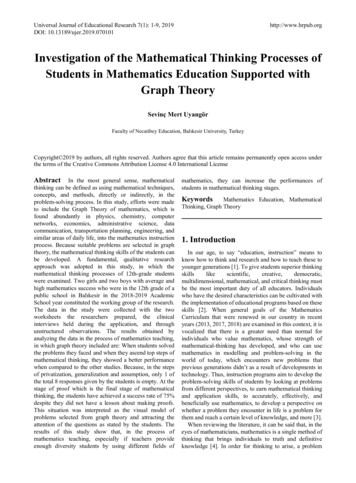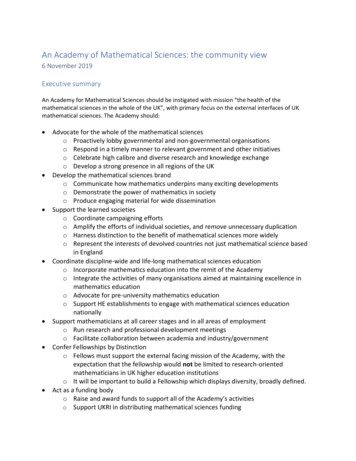
Transcription
An Academy of Mathematical Sciences: the community view6 November 2019Executive summaryAn Academy for Mathematical Sciences should be instigated with mission “the health of themathematical sciences in the whole of the UK”, with primary focus on the external interfaces of UKmathematical sciences. The Academy should: Advocate for the whole of the mathematical scienceso Proactively lobby governmental and non-governmental organisationso Respond in a timely manner to relevant government and other initiativeso Celebrate high calibre and diverse research and knowledge exchangeo Develop a strong presence in all regions of the UKDevelop the mathematical sciences brando Communicate how mathematics underpins many exciting developmentso Demonstrate the power of mathematics in societyo Produce engaging material for wide disseminationSupport the learned societieso Coordinate campaigning effortso Amplify the efforts of individual societies, and remove unnecessary duplicationo Harness distinction to the benefit of mathematical sciences more widelyo Represent the interests of devolved countries not just mathematical science basedin EnglandCoordinate discipline-wide and life-long mathematical sciences educationo Incorporate mathematics education into the remit of the Academyo Integrate the activities of many organisations aimed at maintaining excellence inmathematics educationo Advocate for pre-university mathematics educationo Support HE establishments to engage with mathematical sciences educationnationallySupport mathematicians at all career stages and in all areas of employmento Run research and professional development meetingso Facilitate collaboration between academia and industry/governmentConfer Fellowships by Distinctiono Fellows must support the external facing mission of the Academy, with theexpectation that the fellowship would not be limited to research-orientedmathematicians in UK higher education institutionso It will be important to build a Fellowship which displays diversity, broadly defined.Act as a funding bodyo Raise and award funds to support all of the Academy’s activitieso Support UKRI in distributing mathematical sciences funding
Frequently asked questionsQ: Can’t we achieve these aims with existing institutions?A: There is a clear need for a single institution taking ownership of the above functions for thewhole discipline instead of a fragmented approach. The CMS is overly constrained in itsconstitution, and restricted by its remit and resourcing.Q: The need for advocacy is immediate, whereas setting up an Academy could take many yearsbefore it is effective. How can we avoid having a lot of noise but no effect in the initial years.A: One could imagine bringing together the existing whole-discipline institutions (CMS, INI,ICMS, etc ) to ensure sufficient activity on a realistic timescale without adding to the multitudeof institutions already working in this space.Q: Where do resources come from?A: This is not in the remit for this report, but ideas that have been suggested are: a researchfunding body, government, wealthy individuals, and subscription payments by Fellows.Q: Do we need to have a Fellows by distinction model? What does it mean to be a Fellow?A: Actually, the community does not seem to be too enthusiastic about the concept of Fellows.However, the subscriptions, and the time contributions, of a Fellowship seem to be the mostobvious mechanism to sustain the existence of an Academy. As such, Fellows must be expectedto commit to the objectives of the Academy.Q: Will an Academy be independent?A: It is important that any Academy is entirely independent from the outset. Once established,additional funding can be sort from various sources, including government at a later stage.Q: Would an Academy only represent England or the UK?A: An Academy should also represent the interests of all the countries of the UK and not belimited to just England.Summary of approachWe were tasked with exploring what benefits the mathematical community might wish anAcademy of Mathematical Sciences to provide. We arranged discussions with a series oforganisations, detailed below; we did not have sufficient resource to poll the entiremathematical community for opinions. In the course of these discussions, the question of howto achieve success with an Academy was inevitably discussed, and this document reports asummary of those opinions.Our discoveries can be summarised as follows. Respondents universally felt that themathematical sciences need better advocacy, and better branding. A policy-focused, externally-
facing Academy could potentially deliver this, although everybody was nervous aboutintroducing yet another representative body into an already crowded space, and scepticalabout our ability to receive sufficient funding for an academy to succeed. Nobody expressed adesire to suppress or replace the learned societies, but CMS is seen as being too constrained todeliver what many would like it to achieve. Discipline-wide education might usefully be situatedwithin an Academy, with ACME potentially moving from its current home in the Royal Society.The other national whole-discipline bodies (Isaac Newton Institute and International Centre forMathematical Sciences) consider their role to nurture the discipline, in contrast to an Academyproviding advocacy and branding to gain external support.Who was consulted The Council for the Mathematical SciencesThe individual learned societies affiliated to the Council of the Mathematical Sciences(LMS, IMA, RSS, ORS, EMS)The Isaac Newton InstituteThe International Centre for Mathematical SciencesAdvisory Committee on Mathematics EducationRoyal Academy of EngineeringAcademy of Social SciencesAcademy of Medical SciencesInstitute of PhysicsConference Board of Mathematical Societies (umbrella organisation of USAmathematical societies)We thank representatives of each of these bodies for their time and frank opinions. We alsoattempted to find other Academies of Mathematical Sciences, but discovered that there is onlyone, in Malaysia.What the community would clearly like from an AcademyAdvocacy for the mathematical sciencesAdvocacy was unanimously noted as both missing in the current landscape, and a critical rolefor an Academy. The CMS is constrained by a lack of resource and a need to reach unanimitybetween five learned societies. The former hinders any proactive lobbying for the discipline, forexample for industrial challenges to explicitly include mathematical components. The latterhinders reactivity when government seek the view of the community.The IOP, the Royal Academy of Engineering and the Royal Societies of Chemistry and Biologywork together to lobby and represent their disciplines, whereas the mathematical sciencescommunity (via CMS) is occasionally invited to meetings when one of the other bodies
recognises it is worth inviting us. The IOP inform us that their key staff are all policy people, notscientists; they know how to manipulate government, not the science community, and havepeople in the five countries of the British islands to ensure influence in devolved parliamentsand Ireland.We note here that several discussants, particularly learned societies, were very wary of anAcademy trying to mute their own advocacy and policy statements. Many members of the ORSociety do not identify as mathematicians at all, and the RSS have extremely active policy workon, for example, official statistics, which is not of generic mathematical relevance. However, acommon concern can be paraphrased as follows: Until the mathematical sciences communitystops washing its dirty laundry in public, nobody will take the community seriously, no matterwhat we try to set up. While the public voices of individual societies are extremely valuable, it isimportant that all work together to avoid conflicting messaging.Proactive branding of mathematicsThis is closely linked to advocacy, and was again unanimously recognised as a valuable functionthat an Academy could achieve. While the mathematical science community is very aware thatmathematics underpins many exciting developments, and also of the enormous potential ofmathematics to do much more, most others, including in government and industry, think ofmathematics as little more than arithmetic. This has multiple negative consequences, not leastthat companies and government tend to reach out to other disciplines (computer science,engineering, physics) when they wish to connect with people to create solutions to problemsthat we could consider to be mathematical. An Academy should have a proactive mission todemonstrate the power of the mathematical sciences. Such a campaign would require the inputof individuals both to identify topics worth addressing, presumably related to pertinent issuesin the public domain, and to produce reports that are engaging and demonstrative. It is likelythat such a branding effort would place greater emphasis on “short term useful” mathematicalsciences; those in less applicable research areas would need to recognise that this is a means tothe end of improving the health of the discipline as a whole and does not mean that theAcademy only values immediately-applicable research.Broad churchIt did not come up in all discussions, but where it did it was clear that people believe that allforms of academic mathematics, as well as non-academic mathematicians, must feel supportedby an Academy. All sub-disciplines are nervous about an Academy being dominated by anothersub-discipline, and careful thought will need to go into the structure of the Academy to preventthis happening. The Royal Academy of Engineering has a Fellows’ election process which seemsto have been designed to help ensure breadth is retained. One warning we received in ourdiscussions with other academies was that it is important to avoid over-governing: governancestructures must be appropriate for the level of activity and funding so that the staff of anAcademy are left with some capacity to deliver something other than governance.
What the community would definitely not like from an AcademyAn additional bodyThere is universal agreement that we mustn’t simply add an acronym to the soup. People weregenerally of the opinion that either we should increase the scope and autonomy of CMS, orreplace CMS with an Academy. The proposal here assumes an Academy that initiallycomplements the CMS, leaving open the longer term relationship.DisappointmentEverybody was nervous about the prospect of introducing an under-resourced Academy andraising expectations without capacity to actually make a difference. In addition, several otherAcademies cautioned that we should not expect quick wins within five years, since it takes timefor the benefits to start flowing.DisplacementThere was near universal agreement that an Academy should not replace the existing learnedsocieties. Certainly, most learned societies have aspects of their remit unlikely to be covered byan Academy for the whole discipline, and the diversity of focus as well as subject matter isvaluable for the discipline as a whole. We are reassured by conversations with the Academiesof Engineering and Social Sciences, which both work successfully with multiple sub-disciplinarylearned societies and/or professional bodies. The learned societies in these disciplines havediscovered that their efforts are amplified by working together through the Academies. Thedivision of labour in those academies appears to be that the Academy tends to reach out of thediscipline and engage with others, whereas the learned societies tend to focus in and work withtheir constituents. This does not map directly to the mathematical societies, with the RSS inparticular having an extremely strong policy mission, but may be a useful starting point in tryingto ascertain clear roles for both Academy and learned societies.What the community is not so clear aboutFellowsMost assumed that an Academy would necessarily function on a Fellowship by Distinctionmodel. On the other hand, nobody seemed particularly excited by the idea of Fellows. Chargingapproximately 400 Fellows a 200 pa fee, as other Academies do, would generate a steadyincome. But those Fellows would have to be convinced that (essentially) donating the fee forthe greater good of the discipline is money well spent – few believe that the immediatepersonal return of Fellowship is worth paying for. However it is difficult to see how an Academycould provide its key functions (advocacy, branding) without support of committed volunteers,and Fellowship seems to be the obvious way to get commitment. Other Academies expect theirFellows to contribute to the Academy, and to the greater good of the discipline: the RAE even
give all new Fellows a one-day briefing on expectations, and gives 80-90% of new Fellows a jobimmediately.Taking a positionAn Academy would usually provide authoritative and arm’s-length reports to government ondifficult issues in order to justify receiving government funding (though note that neither IOPnor Academy of Social Sciences receive recurrent government funding). Nobody felt thisfunction was undesirable, but many struggled to find sufficiently many mathematical issuesthat government would care about to induce government to support an Academy. Presumablywith better advocacy and branding, this might change. Some respondents were nervous aboutan Academy muffling their own voice on areas of specialist expertise.EducationAn Academy might be expected to take views on mathematics education, as part of supportingthe discipline. ACME currently consider education at a disciplinary level. They have been astanding committee of the Royal Society since 2017, but note that they are the only singlediscipline education committee: other disciplines look after education in their own academies.There is an argument that the needs of education in mathematics are different from those ofother disciplines, because they need to be more integrated into other, non-mathematics, partsof the curriculum.Most of the learned societies already do education independently as well, although it isinevitably fragmented. Many would not be comfortable about handing this responsibility to anAcademy. EMS expressed a concern that, since education is a devolved matter, any Londonfocused Academy (or learned society for that matter) would be in danger of failing to properlyaddress education in Scotland. Presumably the same issue arises in the other devolvedadministrations. Several have noted that the mathematics education space is so crowded thatto try to make a difference in this space would be time-consuming, and unlikely to producequick wins.Research supportAn Academy would usually host research-level talks, workshops and conferences to helpsupport the discipline. However, the learned societies already provide this service.Furthermore, both the Isaac Newton Institute and the International Centre for MathematicalSciences provide support for the mathematical sciences community at a whole-discipline,whole-country level. Both these centres see their role as supporting the discipline internally,with an Academy being externally facing.FundingEverybody would like to have an additional source of research funding. But the level ofresourcing required to achieve this is unlikely to be achieved in the short term. It is plausiblethat an Academy could take on a role supporting UKRI in awarding fellowships, assisting withbringing mathematicians into industrial strategy challenges and such like. One respondent iskeen for the Academy to act as a point of contact for government and industry seeking
collaboration with mathematical scientists, but many felt this was likely to jeopardise crosscommunity trust.Observations on whether and how to set up an AcademyIs it needed?The people within the mathematical sciences community have, in the main, been lukewarmabout the idea. Few have completely dismissed it, although we suspect politeness was all thatprevented that response in some cases. Everybody recognises the need for better advocacy,and desires better branding. Many feel that a better-resourced, and more agile, Council forMathematical Sciences could deliver these without needing to devote energy and resource tosetting up an Academy. Others feel that an evolved CMS could not escape its shackles anddeliver what is needed. The learned societies have no enthusiasm for contributing furtherresource to CMS, so it would need to develop an ability to generate income independently ifthis were to be plausible. It would also need to develop a greater number of independentcontributors, since almost everybody on CMS is already heavily committed to a learned society.ResourcingThe vast majority of people have been extremely sceptical about whether we can raise externalfunding for an Academy, whether it is directly from government or from a funding body. Mostdo not feel there has been a sufficiently strong case made that wider society will benefit fromthe setting up of an Academy of Mathematical Sciences. However some key people whounderstand how these things work are confident that either (i) a funding body could bepersuaded to offer short term resources to set up an Academy, (ii) sufficient networking ingovernment could find a set of champions of the idea who could then work with us to securefunding, or (iii) wealthy individuals with an affinity to the mathematical sciences might wellmake sizeable donations. (Each idea comes from a different person, and each dismisses theother ideas as highly unlikely!) As already noted, awarding Fellowship by distinction, andcharging an annual fee for the privilege of volunteering, would generate steady, if not verysubstantial, income. EPSRC do not consider it their role to support an Academy.Relationship with learned societiesIt is critical that an Academy has the cooperation of relevant other bodies. Otherwise it willsimply become an additional voice in the chamber. There needs to be agreed areas of focusthat avoid conflict, and effective modes of working to bring the whole community along. TheAcademy should take over the coordinating role of the CMS, but should be an independentbody, and take on the roles of advocacy and branding that the community see as critical. In theearly phases, community support for an Academy is most likely to be generated by enthusiasmdisseminated via the learned societies.
Academy of Medical Sciences Institute of Physics Conference Board of Mathematical Societies (umbrella organisation of USA mathematical societies) We thank representatives of each of these bodies for their time and frank opinions. We also attempted to find other Academies of Mathematical Sciences, but discovered that there is only
